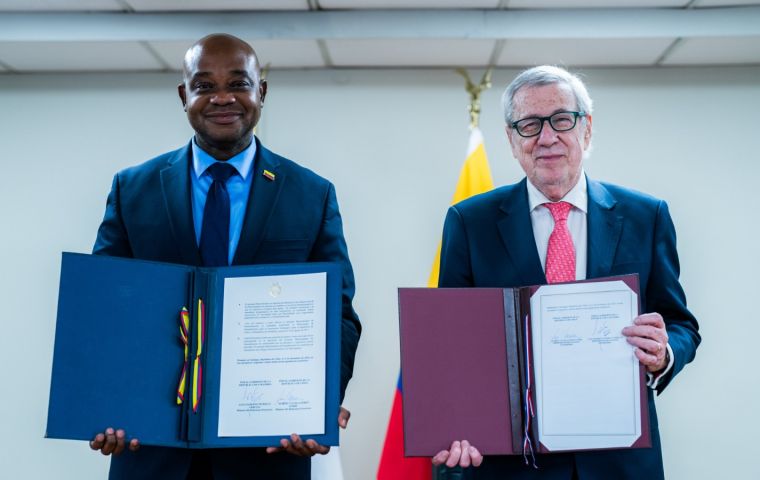MercoPress. South Atlantic News Agency
Chile and Colombia sign feminist foreign policy agreement
 Van Klaveren and Murillo also reviewed the results of the recent Cartagena +40 ministerial meeting
Van Klaveren and Murillo also reviewed the results of the recent Cartagena +40 ministerial meeting The leftwing governments of Chile and Colombia signed Thursday in Santiago two memorandums of understanding to expand their bilateral cooperation. Hosting Foreign Minister Alberto van Klaveren and his Colombian counterpart Luis Gilberto Murillo updated the so-called Strategic Partnership Council to promote a broader joint agenda, in addition to an agreement on Feminist Foreign Policy to promote gender equality by establishing a bilateral alliance aimed at projecting shared values.
“The signing of this memorandum reflects our mutual commitment and interest in generating stronger and more effective bilateral cooperation ties,” Van Klaveren said. The Council's update allows for working autonomously in areas such as economy; culture; education; migration and consular affairs, prioritizing the needs of each nation, he added. This step represents the “commitment to building a closer, more fluid, and more beneficial relationship for our citizens,” he insisted.
“Cooperation between Chile and Colombia has proven to be an engine for progress in various areas. I am convinced that, with the momentum of agreements such as those signed today, we will continue to build a stronger bilateral relationship,” he went on.
Van Klaveren and Murillo also reviewed the results of the recent Cartagena +40 ministerial meeting at the headquarters of the Economic Commission for Latin America and the Caribbean (ECLAC) in Santiago. They also discussed the current situation in Latin America and the world, emphasizing the importance of cooperation between their countries. The Chilean official thanked Colombia for its support and highlighted the shared efforts to face regional challenges. Chile is to hand over the pro tempore presidency of the Pacific Alliance to Colombia on Friday.
On June 9, Van Klaveren brought up Chile's Feminist Foreign Policy (PEF), thus becoming the first country in South America to implement this strategy. ”Although the concept may generate doubts and even suspicions, (...) a feminist foreign policy (...) is the conviction to achieve a more egalitarian world, which recognizes and promotes the rights of women and girls, and duly represents today's societies,“ the foreign minister pointed out at the time.
A feminist foreign policy is about ”a democratic value and a principle that reinforces the image, status, and recognition of the country,“ it was also explained. It was also deemed a ”key condition“ for the fulfillment of the Sustainable Development Goals, established by the UN. Chilean President Gabriel Boric Font launched this initiative in March 2022. Boric paid ”particular” attention to the process of appointing ambassadors.
In 2014, Sweden was the first country to institute a feminist foreign policy, followed by Canada in 2017, France and Luxembourg in 2019, and Mexico and Spain in 2021.




Top Comments
Disclaimer & comment rulesCommenting for this story is now closed.
If you have a Facebook account, become a fan and comment on our Facebook Page!